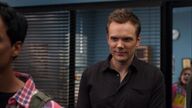①I
don't write comments here often, but I would like to explain some points that I think are more important. It's been strongly suggested throughout the show that Abed does indeed have Asperger's-like problems, a form of autism. I've seen a lot of tweets and comments from bloggers saying Abed was a jerk or an ass in this episode. For me, Abed's behavior is what struck me emotionally in this episode. Let me explain.
I used to be a dormitory assistant at the university. One year, I learned that one of the new boarding students had Asperger's syndrome. I lived and worked with this college-aged young man with autism for five months. He ended up having to leave school because he couldn't stand the pressure the environment put on him. While I wouldn't call myself an Asperger's expert, I think what I can say is that whoever wrote this episode and directed Danny Pudi to perform like this, he definitely knows he has Asperger's People with Burger Syndrome.
Like Abed, the students I live and work with can fit into our residence halls. I can say without any hesitation that we love him, even if some of his reactions are weird and have no discernment. He's an interesting guy and doesn't have Asperger's type of social problems as one might think. Many people feel that people with autism simply cannot fit into social groups, which is incorrect. Like Abed, the young man is a good friend and a fairly good playmate, which means the occasional Asperger's syndrome can be very difficult to deal with. One day I was called to the yard outside the dorm because this student was curled up in a ball, moaning and screaming to himself (sound familiar?). I found out later that something one of his teachers said in class shook one of his key established mindsets. He mulled over the professor's words for hours on end, trying to fit them into his previous system of thought, but he failed, which caused an emotional breakdown. The student, as Abed did, started to push everyone away emotionally, and then it took a long time to stop whining, basically like a lost two-year-old.
I flashed back to my story with this student when I watched this episode tonight. What others have thought of as Abed's assholes and assholes over the past few weeks is an image that I deeply resonate with. The psychoanalysis of Abed's fears I saw tonight, I think, is very profound.
Treating Abed as a jerk is, unfortunately, exactly how many people react to people with Asperger's. They have not been with the patient for a long time, so when the patient's inherent thinking system is no longer applicable, they are extremely disgusted by the violence and emotionality displayed by the patient. The weird thing is I think most people behave similarly when they find their innate way of thinking doesn't work well, except they either internalize new knowledge or defend in an imperceptible way, whereas Asperger's Patients can't do it, they can't do it as well as others. Understanding this helps me to interpret Abed's actions not as jerk behavior, but as the actions of someone with autism who is entangled in the changing world around him. I believe that's the theme of this season, with all the characters struggling with the twists and turns of their lives. Now let's look at Abed again. It's hard to watch this episode, especially for someone who hasn't lived intimately and worked with autistic people, but I think the writers, directors, and actors made this episode a big hit. Right now I'm sitting in front of my computer with tears in my eyes.
②Most
of the [Trash League] fans believe that Abed has Asperger's Syndrome. There are many signs of this: he can't understand how other people feel; he's more inclined to identify with movies and TV than real people; he's obsessed with categorizing events. From the beginning, Harmon didn't want to explicitly specify the character's pathology, but out of curiosity he finally started researching Asperger's.
"So, silly and naive -- I hadn't told anyone before -- I started researching this disorder," Harmon said. "I started looking for these syndromes and I just wanted to know what they were. Like. The more I checked, the more deja vu I felt, so I started doing the online test questions." The test result was positive.
When he set out to write The Crap League, Harmon thought the character he was most associated with was Winger. As Harmon puts it, he has "every defense mechanism I need". But the more questions he did to measure Asperger's, the more he felt that he and Abed were the most alike. He said he had never thought about it that way before because he had been hypersensitive.
Eventually, Harmon saw the doctor and came to understand that the symptoms of this disorder exist at different levels, and that people with inappropriate emotional reactions and deep feelings are actually manifested at one level. Harmon now knew he was a problem at a certain level, and it would take years to figure out which level he was at.
When Harmon created this character who connects the world through television, he didn't feel like he was somehow embedding himself in the show. Once you realize this, it's much easier to create in Abed's tone. All he needs to do, as he puts it, is "start recalling." And he also understands himself a little more, including why he sometimes hurts the people around him unconsciously, like Abed.
At the end of the episode of "Critical Studies in Film," Abed told Jeff about the reason he played Andre (he played Andre in [My Dinner With Andre] in that episode), and was kind of apologetic. He wasn't manipulating him or fooling him. Instead, he chose a movie about two estranged friends because it was the only way he could tell Jeff how he felt about their friendship. Abed, like his creator, was just trying to communicate.
Needless to say, you can see the inner connection between the two comments. My understanding of this show was completely overturned, it had such depth and such a background.
I wish Dan Harmon can find his own answer in the creation.
Review source: http://www.wired.com/magazine/2011/09/mf_harmon/all/1
View more about Anthropology 101 reviews











